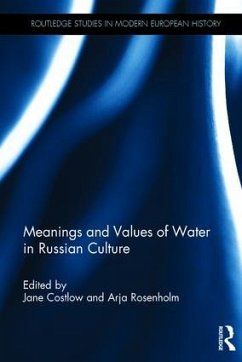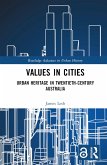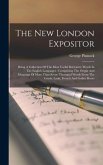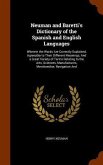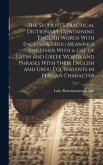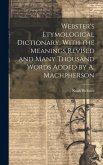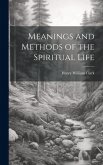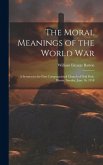Meanings and Values of Water in Russian Culture
Herausgeber: Costlow, Jane; Rosenholm, Arja
Meanings and Values of Water in Russian Culture
Herausgeber: Costlow, Jane; Rosenholm, Arja
- Gebundenes Buch
- Merkliste
- Auf die Merkliste
- Bewerten Bewerten
- Teilen
- Produkt teilen
- Produkterinnerung
- Produkterinnerung
Bringing together a team of scholars from the diverse fields of geography, literary studies and history, this is the first volume to study water as a cultural phenomenon within the Russian/Soviet context. Water in this context is both a cognitive and cultural construct and a geographical and physical phenomenon.
Andere Kunden interessierten sich auch für
![Values in Cities Values in Cities]() James LeshValues in Cities199,99 €
James LeshValues in Cities199,99 €![The New London Expositor: Being A Collection Of The Most Useful Derivative Words In The English Languages: Comprising The Origin And Meanings Of The New London Expositor: Being A Collection Of The Most Useful Derivative Words In The English Languages: Comprising The Origin And Meanings Of]() George PinnockThe New London Expositor: Being A Collection Of The Most Useful Derivative Words In The English Languages: Comprising The Origin And Meanings Of35,99 €
George PinnockThe New London Expositor: Being A Collection Of The Most Useful Derivative Words In The English Languages: Comprising The Origin And Meanings Of35,99 €![Neuman and Baretti's Dictionary of the Spanish and English Languages: Wherein the Words Are Correctly Explained, Agreeably to Their Different Meanings Neuman and Baretti's Dictionary of the Spanish and English Languages: Wherein the Words Are Correctly Explained, Agreeably to Their Different Meanings]() Henry NeumanNeuman and Baretti's Dictionary of the Spanish and English Languages: Wherein the Words Are Correctly Explained, Agreeably to Their Different Meanings45,99 €
Henry NeumanNeuman and Baretti's Dictionary of the Spanish and English Languages: Wherein the Words Are Correctly Explained, Agreeably to Their Different Meanings45,99 €![The Student's Practical Dictionary Containing English Words With English & Urdu Meanings Together With a List of Latin and Greek Words and Phrases Wit The Student's Practical Dictionary Containing English Words With English & Urdu Meanings Together With a List of Latin and Greek Words and Phrases Wit]() The Student's Practical Dictionary Containing English Words With English & Urdu Meanings Together With a List of Latin and Greek Words and Phrases Wit55,99 €
The Student's Practical Dictionary Containing English Words With English & Urdu Meanings Together With a List of Latin and Greek Words and Phrases Wit55,99 €![Webster's Etymological Dictionary, With the Meanings Revised and Many Thousand Words Added by A. Machpherson Webster's Etymological Dictionary, With the Meanings Revised and Many Thousand Words Added by A. Machpherson]() Noah WebsterWebster's Etymological Dictionary, With the Meanings Revised and Many Thousand Words Added by A. Machpherson40,99 €
Noah WebsterWebster's Etymological Dictionary, With the Meanings Revised and Many Thousand Words Added by A. Machpherson40,99 €![Meanings and Methods of the Spiritual Life Meanings and Methods of the Spiritual Life]() Henry William ClarkMeanings and Methods of the Spiritual Life36,99 €
Henry William ClarkMeanings and Methods of the Spiritual Life36,99 €![The Moral Meanings of the World War: A Sermon in the First Congregational Church of Oak Park, Illinois, Sunday, June 16, 1918 The Moral Meanings of the World War: A Sermon in the First Congregational Church of Oak Park, Illinois, Sunday, June 16, 1918]() William Eleazar BartonThe Moral Meanings of the World War: A Sermon in the First Congregational Church of Oak Park, Illinois, Sunday, June 16, 191829,99 €
William Eleazar BartonThe Moral Meanings of the World War: A Sermon in the First Congregational Church of Oak Park, Illinois, Sunday, June 16, 191829,99 €-
-
-
Bringing together a team of scholars from the diverse fields of geography, literary studies and history, this is the first volume to study water as a cultural phenomenon within the Russian/Soviet context. Water in this context is both a cognitive and cultural construct and a geographical and physical phenomenon.
Hinweis: Dieser Artikel kann nur an eine deutsche Lieferadresse ausgeliefert werden.
Hinweis: Dieser Artikel kann nur an eine deutsche Lieferadresse ausgeliefert werden.
Produktdetails
- Produktdetails
- Verlag: Routledge
- Seitenzahl: 286
- Erscheinungstermin: 3. November 2016
- Englisch
- Abmessung: 240mm x 161mm x 20mm
- Gewicht: 596g
- ISBN-13: 9781472447500
- ISBN-10: 1472447506
- Artikelnr.: 69944917
- Herstellerkennzeichnung
- Libri GmbH
- Europaallee 1
- 36244 Bad Hersfeld
- gpsr@libri.de
- Verlag: Routledge
- Seitenzahl: 286
- Erscheinungstermin: 3. November 2016
- Englisch
- Abmessung: 240mm x 161mm x 20mm
- Gewicht: 596g
- ISBN-13: 9781472447500
- ISBN-10: 1472447506
- Artikelnr.: 69944917
- Herstellerkennzeichnung
- Libri GmbH
- Europaallee 1
- 36244 Bad Hersfeld
- gpsr@libri.de
Jane Costlow is the Clark A. Griffiths Professor of Environmental Studies at Bates College in Lewiston, Maine, USA. Her scholarly work has focused primarily on nineteenth-century Russian literature and visual culture, ranging from the novels of Ivan Turgenev to writing by Russian women writers and representations of the bear in late Imperial culture. Recent publications include Heart-Pine Russia: Walking and Writing the 19th century Forest (Cornell University Press, 2013) and, with Amy Nelson, Other Animals: Beyond the Human in Russian Culture and History (University of Pittsburgh Press, 2010). At Bates she teaches courses in Environmental Humanities and Russian Literature, interests reflected in recent papers and conference presentations on disaster narratives in film and oral history. Her translation of Lydia Zinovieva-Annibal's The Tragic Menagerie received the AATSEEL prize for best translation in 1999. Arja Rosenholm is Professor of Russian Language and Culture at the University of Tampere, Finland. Her research interests include the history of Russian literature and culture, gender studies, Russian popular culture and mass media, ecocriticism, space, and culture. She is currently heading the Academy of Finland-funded project "Water as Cultural Space: Changing Values and Representations" (2012-2016). Rosenholm has edited several scholarly volumes in English, Russian, and Finnish, and published numerous peer-reviewed articles in international and national journals. Recent books include Women in Russian Cultural History (in Finnish), with Suvi Salmenniemi and Marja Sorvari. (Gaudeamus, 2014), and Topografii populiarnoi kul'tury together with Irina Savkina. (NLO, 2015).
Introduction
Section One: Language and Myths of Water
1 Ivan Podiukov, "Cultural Semantics of Aquatic Imagery in the Russian
Language"
2 Nicholas Breyfogle, "Sacred Waters: The Spiritual World of Lake Baikal"
3 Evgeny Platonov, "Wells of Superstition: The History of Holy Springs in
Russia, 18th - 19th Centuries"
4 Dmitrii Zamyatin: "Thinking with Water in a Russian Context"
Section Two: Socio-Cultural Identities of Water
5 Oleg Riabov, "Mother Volga and the Construction of Russian Identity"
6 Maria Litovskaia, "The Chief Worker of the Urals": Metanarrative of the
Chusovaia River and its Creation"
7 Sveta Yamin-Pasternak, Andrew Kliskey, Lilian Alessa and Peters
Schweitzer, "A Cup of Tundra: Ethnography of Thirst in the Bering Strait"
Section Three: Water Rebuilding Landscapes
8 Elena Miliugina and Mikhail Stroganov, "Water on the Russian Gentry
Estate"
9 Polina Barskova, "Celebrating the Return of the Flood of Petersburg:
1824/1924"
10 Cynthia Ruder, "Imagined and Real: The Moscow Canal as the Port of Five
Seas"
Section Four: Aesthetics and Poetics of Water
11 Anastasia Kostetskaya, "A Woman in Nature/A Woman is Nature: The Eternal
Feminine as a Conceptual Blend of Human and Water Ontologies in Russian
Symbolist Poetics"
12 Jane Costlow, "Parched: Water and its Absence in the Films of Larisa
Shepit'ko"
13 Arja Rosenholm, "The Energizing Flow of Water in Marietta Shaginian's
Novel Hydrocentral"
14 Gitta Hammarberg, "Spatriotism: Water in Literary Polemics (Early 19th
century Russia"
Section One: Language and Myths of Water
1 Ivan Podiukov, "Cultural Semantics of Aquatic Imagery in the Russian
Language"
2 Nicholas Breyfogle, "Sacred Waters: The Spiritual World of Lake Baikal"
3 Evgeny Platonov, "Wells of Superstition: The History of Holy Springs in
Russia, 18th - 19th Centuries"
4 Dmitrii Zamyatin: "Thinking with Water in a Russian Context"
Section Two: Socio-Cultural Identities of Water
5 Oleg Riabov, "Mother Volga and the Construction of Russian Identity"
6 Maria Litovskaia, "The Chief Worker of the Urals": Metanarrative of the
Chusovaia River and its Creation"
7 Sveta Yamin-Pasternak, Andrew Kliskey, Lilian Alessa and Peters
Schweitzer, "A Cup of Tundra: Ethnography of Thirst in the Bering Strait"
Section Three: Water Rebuilding Landscapes
8 Elena Miliugina and Mikhail Stroganov, "Water on the Russian Gentry
Estate"
9 Polina Barskova, "Celebrating the Return of the Flood of Petersburg:
1824/1924"
10 Cynthia Ruder, "Imagined and Real: The Moscow Canal as the Port of Five
Seas"
Section Four: Aesthetics and Poetics of Water
11 Anastasia Kostetskaya, "A Woman in Nature/A Woman is Nature: The Eternal
Feminine as a Conceptual Blend of Human and Water Ontologies in Russian
Symbolist Poetics"
12 Jane Costlow, "Parched: Water and its Absence in the Films of Larisa
Shepit'ko"
13 Arja Rosenholm, "The Energizing Flow of Water in Marietta Shaginian's
Novel Hydrocentral"
14 Gitta Hammarberg, "Spatriotism: Water in Literary Polemics (Early 19th
century Russia"
Introduction
Section One: Language and Myths of Water
1 Ivan Podiukov, "Cultural Semantics of Aquatic Imagery in the Russian
Language"
2 Nicholas Breyfogle, "Sacred Waters: The Spiritual World of Lake Baikal"
3 Evgeny Platonov, "Wells of Superstition: The History of Holy Springs in
Russia, 18th - 19th Centuries"
4 Dmitrii Zamyatin: "Thinking with Water in a Russian Context"
Section Two: Socio-Cultural Identities of Water
5 Oleg Riabov, "Mother Volga and the Construction of Russian Identity"
6 Maria Litovskaia, "The Chief Worker of the Urals": Metanarrative of the
Chusovaia River and its Creation"
7 Sveta Yamin-Pasternak, Andrew Kliskey, Lilian Alessa and Peters
Schweitzer, "A Cup of Tundra: Ethnography of Thirst in the Bering Strait"
Section Three: Water Rebuilding Landscapes
8 Elena Miliugina and Mikhail Stroganov, "Water on the Russian Gentry
Estate"
9 Polina Barskova, "Celebrating the Return of the Flood of Petersburg:
1824/1924"
10 Cynthia Ruder, "Imagined and Real: The Moscow Canal as the Port of Five
Seas"
Section Four: Aesthetics and Poetics of Water
11 Anastasia Kostetskaya, "A Woman in Nature/A Woman is Nature: The Eternal
Feminine as a Conceptual Blend of Human and Water Ontologies in Russian
Symbolist Poetics"
12 Jane Costlow, "Parched: Water and its Absence in the Films of Larisa
Shepit'ko"
13 Arja Rosenholm, "The Energizing Flow of Water in Marietta Shaginian's
Novel Hydrocentral"
14 Gitta Hammarberg, "Spatriotism: Water in Literary Polemics (Early 19th
century Russia"
Section One: Language and Myths of Water
1 Ivan Podiukov, "Cultural Semantics of Aquatic Imagery in the Russian
Language"
2 Nicholas Breyfogle, "Sacred Waters: The Spiritual World of Lake Baikal"
3 Evgeny Platonov, "Wells of Superstition: The History of Holy Springs in
Russia, 18th - 19th Centuries"
4 Dmitrii Zamyatin: "Thinking with Water in a Russian Context"
Section Two: Socio-Cultural Identities of Water
5 Oleg Riabov, "Mother Volga and the Construction of Russian Identity"
6 Maria Litovskaia, "The Chief Worker of the Urals": Metanarrative of the
Chusovaia River and its Creation"
7 Sveta Yamin-Pasternak, Andrew Kliskey, Lilian Alessa and Peters
Schweitzer, "A Cup of Tundra: Ethnography of Thirst in the Bering Strait"
Section Three: Water Rebuilding Landscapes
8 Elena Miliugina and Mikhail Stroganov, "Water on the Russian Gentry
Estate"
9 Polina Barskova, "Celebrating the Return of the Flood of Petersburg:
1824/1924"
10 Cynthia Ruder, "Imagined and Real: The Moscow Canal as the Port of Five
Seas"
Section Four: Aesthetics and Poetics of Water
11 Anastasia Kostetskaya, "A Woman in Nature/A Woman is Nature: The Eternal
Feminine as a Conceptual Blend of Human and Water Ontologies in Russian
Symbolist Poetics"
12 Jane Costlow, "Parched: Water and its Absence in the Films of Larisa
Shepit'ko"
13 Arja Rosenholm, "The Energizing Flow of Water in Marietta Shaginian's
Novel Hydrocentral"
14 Gitta Hammarberg, "Spatriotism: Water in Literary Polemics (Early 19th
century Russia"

